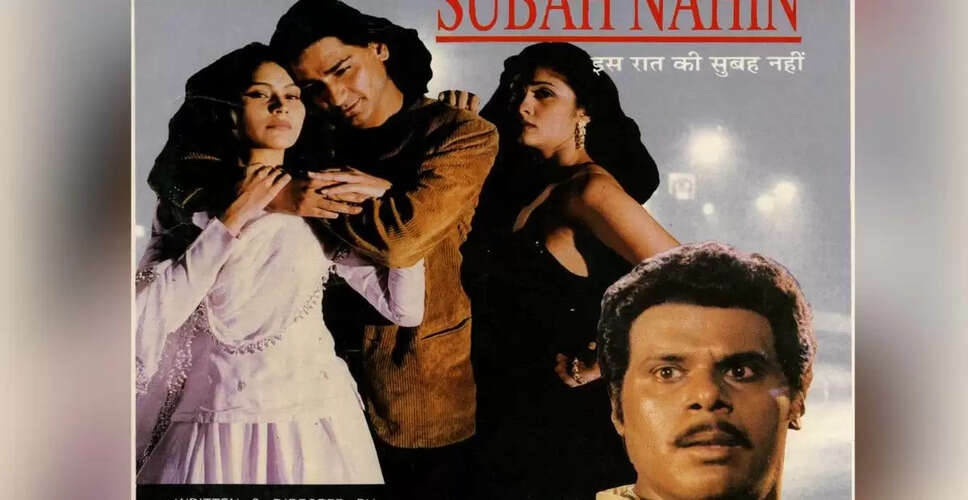Sudhir Mishra Reflects on 29 Years of Is Raat Ki Subah Nahin

The Inspiration Behind Is Raat Ki Subah Nahin
Sudhir shares the story behind the creation of Is Raat Ki Subah Nahin, which has now completed 29 years. What sparked this deep dive into the complexities of human relationships and politics?
While studying at a film institute in Pune, Sudhanshu, Sudhir's brother, faced a troubling incident when local thugs harassed a fellow student. In a moment of bravery, he slapped one of the goons, unaware that he was related to a notorious gang leader. This led to a tense situation where the institute was surrounded by the gang. Security intervened, and Sudhanshu found a hiding spot while his classmates were terrified. The gang was demanding, “Bring out Lambu!” Sudhanshu was notably taller than Sudhir.
This incident laid the groundwork for Is Raat Ki Subah Nahin.
It was a harrowing experience that lasted two days. Eventually, local officials got involved, and with a call from their father, the situation was resolved. Sudhir always encouraged Sudhanshu to turn this experience into a film, believing it would make for a compelling narrative—just two days in a life.
So, why didn’t he pursue it?
Sudhanshu did draft a script titled Bhaag Vijay with Pankaj Advani, another student from the institute. The details of that script remain unknown, as both Pankaj and Sudhanshu have since passed away. However, if anyone possesses that script, it could still be brought to life.
Indeed.
Sudhir, on the other hand, created a different film inspired by those events during a personal divorce. At that time, Mumbai was chaotic, with many individuals shouting, “Bhai ka aadmi!” He had his own close calls, particularly while filming Mohan Joshi Hazir Ho with Saeed Mirza in Doo Taanki, where gang activity was rampant.
Those were tumultuous times.
In the 1990s, corporate India was booming. The economy was liberalizing, and Sudhir found himself questioning, “Who is the real hero?” He intentionally cast Nirmal Pandey as the advertising executive and Ashish Vidyarthi, who had a darker persona, as the gang leader. By the film's conclusion, viewers are left uncertain about who the true gangster is and who is not, blurring the lines between good and bad. There’s a memorable exchange where the gangster questions the corporate man about their world, to which the advertising executive responds, “Yes, just as in your world, murder happens…”
Was it challenging to create something as unconventional as Is Raat Ki Subah Nahin early in your career?
It was relatively straightforward, thanks to the support of producers Mahesh Bhatt and Amit Khanna, who were like elder brothers to him. Growing up in the film industry, he benefited from the kindness of figures like Javed Akhtar, Saeed Mirza, Shekhar Kapur, Amit Khanna, and Mahesh Bhatt. When he presented the script, they had just one suggestion.
What was that suggestion?
They proposed adding some songs. Sudhir agreed, and M.M. Kreem was brought on board to compose the music. Tracks like Chup Tum Raho, Jeevan Kya Hai, and Tere Mere Naam remain popular even today. Most of the cast was relatively new, including brilliant Marathi theatre actors like Sandeep Kulkarni, Kishore Kadam, and Ganesh Yadav, who were just starting their careers. This film marked Saurabh Shukla’s first significant role as a gangster, although he had a minor part in Bandit Queen earlier. This was two years before his iconic Kallu Mama role. Many actors in Is Raat Ki Subah Nahin were making their debut, including Tara Deshpande and Smriti Mishra. Sudhir cherished working with them over 60 nights in Mumbai, feeling a deep connection to the city, having previously made films set in its chawls. The film was well-received, and he continues to be recognized for it, as it seems to have inspired a new genre of filmmaking.
What do you recall about the film's acclaim?
Sudhir remembers receiving a call from Ram Gopal Varma, who praised the film for an hour. Anurag Kashyap and others also expressed their admiration. Ramu’s Satya was released two years later, and even Lock, Stock & Two Smoking Barrels followed suit. He disagrees with claims that he copied Guy Ritchie in Yeh Saali Zindagi, asserting that he was simply exploring his own questions!
